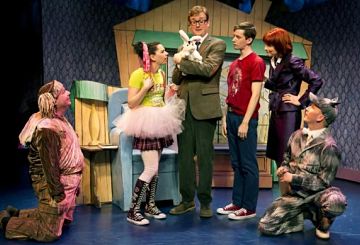 Downtown theater legend Charles Busch is best known for his satiric gender-bender plays. So it's something of a revelation to see him adapting a best-selling children's book into "a rabbit tale of musical mystery." But Busch knows how to reach the 4+ set, peppered with enough zippy New York references to keep parents happy.
Downtown theater legend Charles Busch is best known for his satiric gender-bender plays. So it's something of a revelation to see him adapting a best-selling children's book into "a rabbit tale of musical mystery." But Busch knows how to reach the 4+ set, peppered with enough zippy New York references to keep parents happy.
Now at the DR2 Theater, Bunnicula, tells a sweet tale of family, friendship and yes, vampires. Forget the Bram Stoker variety; this one hails from the animal kingdom. The strange happenings around the Monroe house arouse the suspicions of Chester the cat, who has his doubts about the family's new pet rabbit.
Is it just coincidence they find him in a box during a screening of Dracula? Or that his eyes blaze red when on a flavor-sucking vegetable tear? Chester tries to convince Harold the dog, who only sees an adorable fur ball. But savvy Chester, a vampire maven, dubs Bunnicula "the hare from hell."
Based on the book by Deborah and James Howe, Busch celebrates the story's friendship/acceptance lessons, accompanied by amusing songs, the handiwork of lyricist Mark Waldrop and composer Sam Davis. Even the parents were humming on the way out.
The kooky premise is perfect for the pre-school set. They will enjoy the fun tale, and the feel-good tolerance lesson thrown in for good measure.
Busch's longtime director Carl Andress keeps the action -- and the jazz hands -- apace, aided by six delightful actors. The mystery element is a stretch, but the show will win over its young audience.
Conversely, Les Misérables fans who saw the Broadway production and raced to the star-studded film will appreciate this lavish new book, Les Misérables - From Stage To Screen. Writer Benedict Nightingale, former theater critic of the London Times, and Martyn Palmer, a film journalist, expertly chronicle the musical's long journey from inception to big screen.
It's both a tribute to the musical and a desire to explore all the elements that define its artistry. For the authors, it's clearly a labor of love.
The brainchild of two Frenchmen, composer Claude-Michel Schönberg and lyricist Alain Boublil, Les Mis has been seen by more than 60 million theatergoers worldwide. (Herbert Kretzmer adapted the English lyrics). Based on the Victor Hugo novel, it details the life of Jean Valjean and his quest for redemption in 19th-century revolutionary France.
The musical debuted in Paris in 1980, where Les Mis enjoyed a three-month run. But its global success is traced to a fateful day in 1982, when Cameron Mackintosh decided to produce the show; he helped transform a concept album into a theatrical phenomena.
True, the critics' reactions were mixed at the show's opening, but the public was triumphantly behind it.
Divided between the musical's stage history and its recreation as a film, the book provides a behind-the-scenes look at its theatrical innovations and principals, as well as clever marketing. The logo of Cosette, taken from an etching by Emile Bayard, Hugo's favorite illustrator, is now recognized worldwide.
This impressively researched work includes pullouts, such as costume sketches, annotated scripts and scores, and a poster for the Barbican's 15th anniversary production.
The cinematic risks are also explored, such as director Tom Hooper's decision to let his actors sing live rather than in the studio. He dressed many of his crew in period costume, holding hand-held cameras in the thick of the action, trying to make the experience as real as possible.
Defying critics and its own title, Les Mis is in its 28th year. It's still running in London, and there are 16 productions in the U.S. alone. This beautifully produced, well-written book explains why.
Bunnicula photo: Jeremy Daniel
